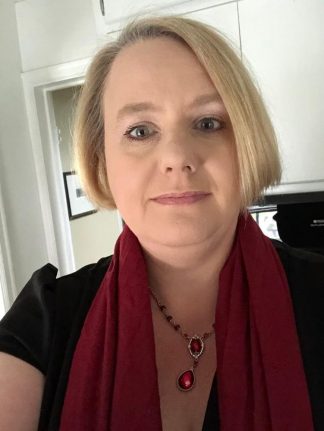By Allison Campbell-Jensen
Stacie Traill, now Metadata and Discovery Analyst, began as a student worker in the Music Library. Since then, she has worked in cataloging, acquisitions, and technical services. She belongs to the team that strives to improve the technical side of the Libraries on behalf of users.
What drives her?
“The thing that really motivates me is being able to have an impact on how easily or how comprehensively or … how well a library user can get to the resources that they need,” Traill says.
That may be through our Libraries search tool, linking back to our resources from WorldCat, or, with co-workers, facilitating temporary emergency access to the digital repository HathiTrust.
Connecting systems
Traill is on the team that manages Alma, the Libraries’ management system, and Primo, its discovery system. In Alma, she works on resource management, which includes cataloging and electronic resources. She is responsible for system configuration and coordinating large-scale enhancements of metadata in the system.
“I want to help users to get the most out of the vast and deep and broad Libraries’ collections that we have, by facilitating excellent discovery.”
—Stacie Traill
“I work closely with folks in the e-resources management unit to work with e-resources metadata for discovery,” she says, “including coordination of the Central Discovery Index, which is the piece of Alma and Primo that provides all of those millions of article records when you do a search in Libraries search.
In this role, she’ll often do batch changes to metadata that change hundreds or thousands of records at one time. The changes may be necessary because new metadata standards have been adopted.
“As we move toward a vision of the ‘collective collection’ across many institutions, this need becomes even more critical,” Traill says. “Without complete, accurate, and up-to-date metadata, it’s much harder for us to be certain about how our collection overlaps with the collections of other institutions.”
Terms used to describe marginalized people may be updated, errors may need to be corrected, or additional information may clarify the holdings. She has to keep in mind, however, what the implications for changes at that scale may be as they work their way across the system. She wants to change things for the better — not the other way around.
Discovery to access
She and Malaika Grant are co-chairs of the Libraries’ Discovery-to-Access Steering Committee. Grant works closely with Libraries’ subject liaisons and public services staff, while Traill coordinates the technical side of Primo — the Libraries search. “Between the two of us,” Traill says, “we draw on everybody’s knowledge across the organization to make continuous improvements to the Libraries’ discovery services and tools.”
New tools, services, and resources appear all the time, she notes. Yet the goal remains the same. Says Traill: “I want to help users to get the most out of the vast and deep and broad Libraries’ collections that we have, by facilitating excellent discovery.”





